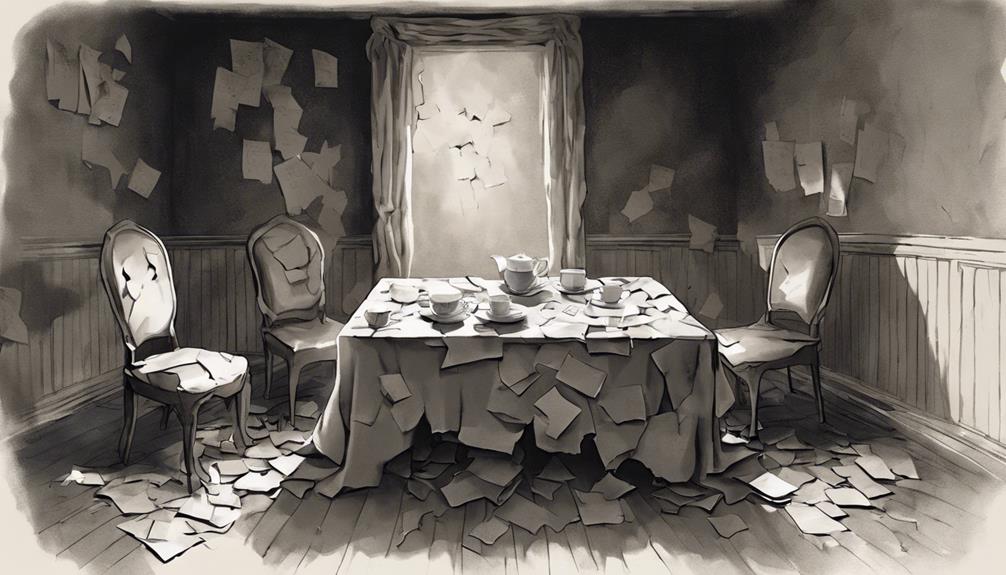Steering through the aftermath of marital betrayal can feel overwhelming and disheartening. You're likely experiencing a swirl of emotions like anger, sadness, and confusion. Acknowledging these feelings is crucial for your healing journey. Consider journaling your thoughts or engaging in activities that bring you joy. Open communication with your partner is essential, so try using 'I' statements to express your feelings without blame. Rebuilding trust takes time, but it's possible with consistent effort and vulnerability. Don't forget, seeking professional support can provide guidance and understanding. There's much more to explore that can aid you in this challenging time.
Understanding Betrayal's Impact

Betrayal can shake your world, leaving you grappling with intense emotions and questioning the very foundation of your relationship. The trauma of betrayal often leads to feelings of confusion, anger, and deep sadness, making it difficult to navigate your daily life. Understanding betrayal trauma is the first step toward healing. It's vital to recognize that these feelings are valid and part of the process.
To cope effectively, you can implement several strategies. Start by allowing yourself to feel your emotions without judgment; it's okay to cry, yell, or even seek comfort from friends. Journaling can also help you articulate your thoughts and feelings, providing clarity amid the chaos.
Establishing a support network is important—surround yourself with people who understand your pain and can offer encouragement. Additionally, practicing mindfulness and self-care can greatly aid in your recovery. Engage in activities that bring you joy, whether it's exercise, art, or spending time in nature.
Emotional Responses to Infidelity
When infidelity occurs, it's natural to experience a whirlwind of emotions that can feel overwhelming and isolating. You might feel anger, betrayal, sadness, or even guilt. It's important to recognize these feelings as normal reactions to a painful situation. Guilt, in particular, can be tricky to manage; it's easy to blame yourself for your partner's actions.
To navigate these emotional responses, consider implementing effective coping strategies. Journaling can help you process your thoughts, while physical activities like exercise can release pent-up tension. Talking to a trusted friend or therapist can provide you with perspective and support. It's imperative to prioritize self-care during this time—engaging in activities that bring you joy or comfort can make a significant difference.
Additionally, practicing guilt management is essential. Acknowledge your feelings without letting them define you. Remind yourself that you're not responsible for your partner's choices. By focusing on your emotional healing and finding constructive outlets for your feelings, you can begin to regain a sense of control and move forward.
Communication Challenges After Betrayal

Steering conversations after infidelity can feel intimidating, as trust has been shaken and emotions run high. You might find that honesty barriers complicate discussions, making it hard to express your feelings without triggering defensiveness. To maneuver through this, focus on creating a safe space for dialogue.
Start by practicing active listening. This means truly hearing what your partner is saying, without formulating your response while they speak. Show empathy and validate their feelings; it can help lower defenses and encourage openness.
When it's your turn to share, aim for honesty while being mindful of your partner's emotional state. Use “I” statements to express your feelings rather than placing blame—this can reduce the likelihood of escalating tensions.
Also, consider setting aside specific times for these conversations. This approach can help both of you mentally prepare for discussions and guarantee that they don't turn into unproductive arguments.
Rebuilding Trust in Relationships
Rebuilding trust after infidelity requires consistent effort and a willingness to be vulnerable with each other.
It's important to openly discuss feelings and fears, creating a safe space for both partners. Trust exercises can play a significant role in this process. Try engaging in activities that promote honesty and transparency, like sharing daily reflections or setting aside time for deep conversations. These exercises help you both understand each other's perspectives and rebuild that important sense of security.
As you navigate this journey, focus on rebuilding intimacy. Emotional closeness is key to restoring trust.
Share your thoughts, dreams, and even fears, allowing each other to witness your growth. Small gestures of affection can go a long way—whether it's a simple touch or a heartfelt compliment.
Impact on Children and Family Dynamics

Infidelity can profoundly affect children and family dynamics, often leaving lasting emotional scars that require careful navigation and support. When betrayal occurs, your children may experience significant emotional turmoil. They might feel confused, hurt, or even blame themselves for the situation. It's essential to acknowledge their feelings and provide a safe space for open communication.
Family role changes often arise in the wake of infidelity, as parents may find themselves adjusting their responsibilities or emotional availability. This alteration can be unsettling for children, who thrive on consistency and security. To ease this change, establish clear routines and maintain open dialogues about what's happening.
Encourage your kids to express their thoughts and emotions, validating their feelings without judgment. You might also consider involving them in family activities that reinforce unity and support.
Seeking Professional Support
In the aftermath of betrayal, seeking professional support can offer your family the guidance needed to process emotions and rebuild trust effectively. It's a vital step for healing, and you shouldn't underestimate its importance.
Therapy options like individual counseling or couples therapy can provide a safe space for all involved to express feelings and work through the pain. A trained therapist can help you navigate the complexities of your emotions and develop constructive communication strategies.
Support groups can also be incredibly beneficial. Connecting with others who've experienced similar betrayals can help you feel less isolated. Sharing your story and hearing others' can foster a sense of community and understanding, making the healing process a bit easier.
Consider exploring both therapy options and support groups to find what works best for your family's unique situation. Reaching out for help doesn't signify weakness; it shows strength and a commitment to healing.
Moving Forward With Healing

Healing after betrayal requires intentional steps and a commitment to understanding the emotions at play, allowing you and your partner to create a path forward together.
Start by prioritizing self-care strategies. Engage in activities that nurture your well-being, whether it's exercising, journaling, or practicing mindfulness. These actions can help you regain a sense of control and peace amid the turmoil.
Next, it's essential to communicate openly with your partner. Share your feelings, fears, and hopes for the future. Honest conversations can foster understanding and rebuild trust, which is vital for healing. You might also consider setting boundaries to create a safe space for both of you.
Embrace this journey as an opportunity for personal growth. Reflect on your values and desires, and consider what you've learned about yourself and your relationship through this experience. This reflection can help you rebuild a stronger foundation together.
Lastly, remember that healing isn't linear. Be patient with yourself and each other as you navigate this challenging path. By actively engaging in self-care and fostering open communication, you can move toward a healthier, more resilient partnership.
Conclusion
Steering through the aftermath of marital betrayal isn't easy, but remember, healing is possible.
Acknowledge your feelings and communicate openly with your partner, even when it's tough.
Rebuilding trust takes time, so be patient with yourself and each other.
If you're struggling, don't hesitate to seek professional support.
With commitment and understanding, you can move forward, not just as individuals but as a stronger couple.
Embrace the journey towards healing and a renewed relationship.
